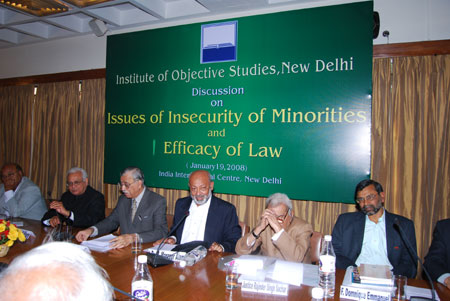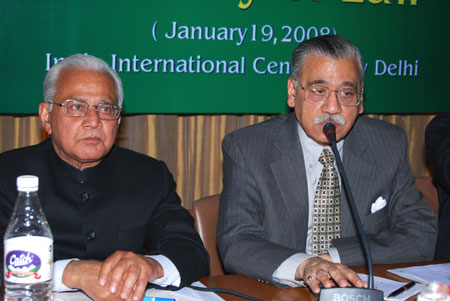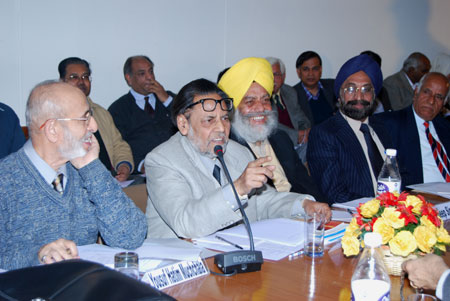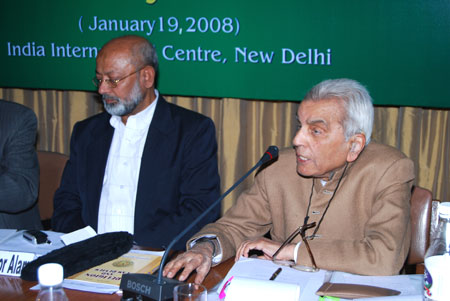IOS DISCUSSION ON INSECURITY OF MINORITIES AND EFFICACY OF LAW
January 19, 2008
India Intenational Centre, Max Mueller Marg, New Delhi

L-R: Manzoor Ahmad, Justice V N Khare, Justice A M Ahmadi, Dr Manzoor Alam, Justice Rajinder Sachar and Father Dominique Emmanuel
New Delhi, Jan. 19: A sense of insecurity in any section of society has the capability to jeopardise peace, prosperity and stability of a country. It is time to create an environment in which people could live without fear. This was the view of speakers of a discussion on "Issues of Insecurity of Minorities and Efficacy of Law" here at India International Centre. The programme was organised by Institute of Objective Studies. The participants also discussed as to how to make the law more efficient.
| |
|

L-R: Justice V N Khare and Justice A M Ahmadi
Presiding over the discussion Justice A.M. Ahmad, former Chief Justice of India, said there was an endeavour on the part of certain groups to sow the seed of insecurity in minorities. Referring to the attacks on Christians and their churches and hostels in Orissa, Justice Ahmadi said, minorities were being marginalised and their voices silenced by instilling in them a sense of insecurity. "The culture of impunity is growing."
Former Chief Justice of India Justice V.N. Khare, who was the chief guest, emphatically said first duty of a democratic state was to protect minorities. Justice Khare said there should be an autonomous body to look into a case of communal flare-up and prosecute offenders of communal riots. "De facto doctrine of equality should be given to minorities," he averred.
Dr John Dayal, President All India Catholic Union, said civil society was dead in Orissa. Christians were brutally beaten up, their prayer halls, hostels and other properties were put on fire. But the state machinery was a mute spectator.

Justice Rajender Sachar, Prof. Iqbal A. Ansari, Mr Chaman Lal, Mr Yousuf Hatim Muchchala, Father Domnique Emmanuel, Dr Abusaleh Shariff also spoke on the topic.

At the end of the deliberations, the following resolution was adopted: The Central Government should take measures to develop a culture of courage and enable the civil society to meet the threat posed by the Hindutva elements; human Rights regime in the country should be put in its right place through legal literacy and accountability of administrative and enforcement agencies incorporating the principle of command responsibility. The case of Bilkis Bano's case (transferred from Gujarat to Maharashtra pursuant to Supreme Court's directions) proves the point that a lay citizen takes courage to vindicate her human rights, justice is meted out; Insecurity has taken all minorities into its grip and measures for controlling violence are required to be extended to all sensitive localities and regions. Insults are heaped on Christians and Churches and destroyed in Orissa with impunity and their properties and lives are destroyed; hate campaigns having become a regular feature of certain groups to meet their political ends, there should be zero tolerance towards such dangerous activities by the authorities and appropriate legislation be enacted making authorities liable for their non-action in such matters.
It also demanded that measures like observance of administrative ethics and accountability to minorities should be effectively used to prevent communal violence and loss of life and property of the members of minority communities.
It mooted a people's movement aligning all disadvantaged groups to be launched, making it incumbent on the civil society to come forward and play its role in curbing growth of hate and intolerance deliberately encouraged by some vested interests. In this connection, it was also deemed necessary that the corporate world should discharge its social responsibility towards disadvantaged groups of people and come forward with positive policies on issues of maintaining social and economy harmony in the country.
|
Go Back